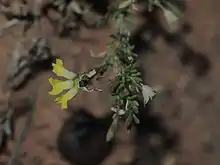| Goodenia modesta | |
|---|---|
 | |
| Scientific classification | |
| Kingdom: | Plantae |
| Clade: | Tracheophytes |
| Clade: | Angiosperms |
| Clade: | Eudicots |
| Clade: | Asterids |
| Order: | Asterales |
| Family: | Goodeniaceae |
| Genus: | Goodenia |
| Species: | G. modesta |
| Binomial name | |
| Goodenia modesta | |
Goodenia modesta is a species of flowering plant in the family Goodeniaceae and is endemic to central Australia. It is an erect perennial herb with leaves lance-shaped in outline at the base of the plant, and racemes or thyrses of yellow flowers.
Description
Goodenia modesta is an erect, perennial herb that typically grows to a height of up to 50 cm (20 in) long with stems that are round in cross-section. The leaves at the base of the plant are pinnatifid to lyrate, lance-shaped in outline with the narrower end towards the base, up to 80 mm (3.1 in) long and 20 mm (0.79 in) wide. Leaves on the stem are smaller. The flowers are arranged in racemes or thyrses up to 450 mm (18 in) long, with bracts 5–20 mm (0.20–0.79 in) long, each flower on a pedicel 3–5 mm (0.12–0.20 in) long. The sepals are linear to lance-shaped, 2–3 mm (0.079–0.118 in) long, the petals yellow and 12–14 mm (0.47–0.55 in) long. The lower lobes of the corolla are about 4 mm (0.16 in) long with wings about 1.5 mm (0.059 in) wide, the central lobe with a prominent dish or pocket. Flowering occurs in most months and the fruit is a more or less cylindrical capsule 4 mm (0.16 in) long.[2][3][4][5]
Taxonomy and naming
Goodenia modesta was described in 1912 by John McConnell Black in Transactions and Proceedings of the Royal Society of South Australia.[6][7] The specific epithet (modesta) means "modest or unassuming".[8]
Distribution and habitat
This goodenia grows in red loam and sand with Acacia aneura and on hummock grassland in central Australia, in the states of Western Australia, the Northern Territory and South Australia.[2][3][4][5]
Conservation status
Goodenia modesta is classified as of "least concern" under the Northern Territory Government Territory Parks and Wildlife Conservation Act 1976 but as "Priority Three" by the Government of Western Australia Department of Parks and Wildlife meaning that it is poorly known and known from only a few locations but is not under imminent threat.[3][5][9]
References
- ↑ "Goodenia modesta". Australian Plant Census. Retrieved 12 March 2021.
- 1 2 Carolin, Roger C. "Goodenia modesta". Australian Biological Resources Study, Department of Agriculture, Water and the Environment: Canberra. Retrieved 12 March 2021.
- 1 2 3 "Goodenia modesta". FloraBase. Western Australian Government Department of Biodiversity, Conservation and Attractions.
- 1 2 "Goodenia modesta". State Herbarium of South Australia. Retrieved 12 March 2021.
- 1 2 3 "Goodenia modesta". Northern Territory Government. Retrieved 12 March 2021.
- ↑ "Goodenia modesta". APNI. Retrieved 12 March 2021.
- ↑ Black, John McConnell (1912). "Additions to the Flora of South Australia". Transactions and Proceedings of the Royal Society of South Australia. 36: 172. Retrieved 12 March 2021.
- ↑ Sharr, Francis Aubi; George, Alex (2019). Western Australian Plant Names and Their Meanings (3rd ed.). Kardinya, WA: Four Gables Press. p. 254. ISBN 9780958034180.
- ↑ "Conservation codes for Western Australian Flora and Fauna" (PDF). Government of Western Australia Department of Parks and Wildlife. Retrieved 12 March 2021.
